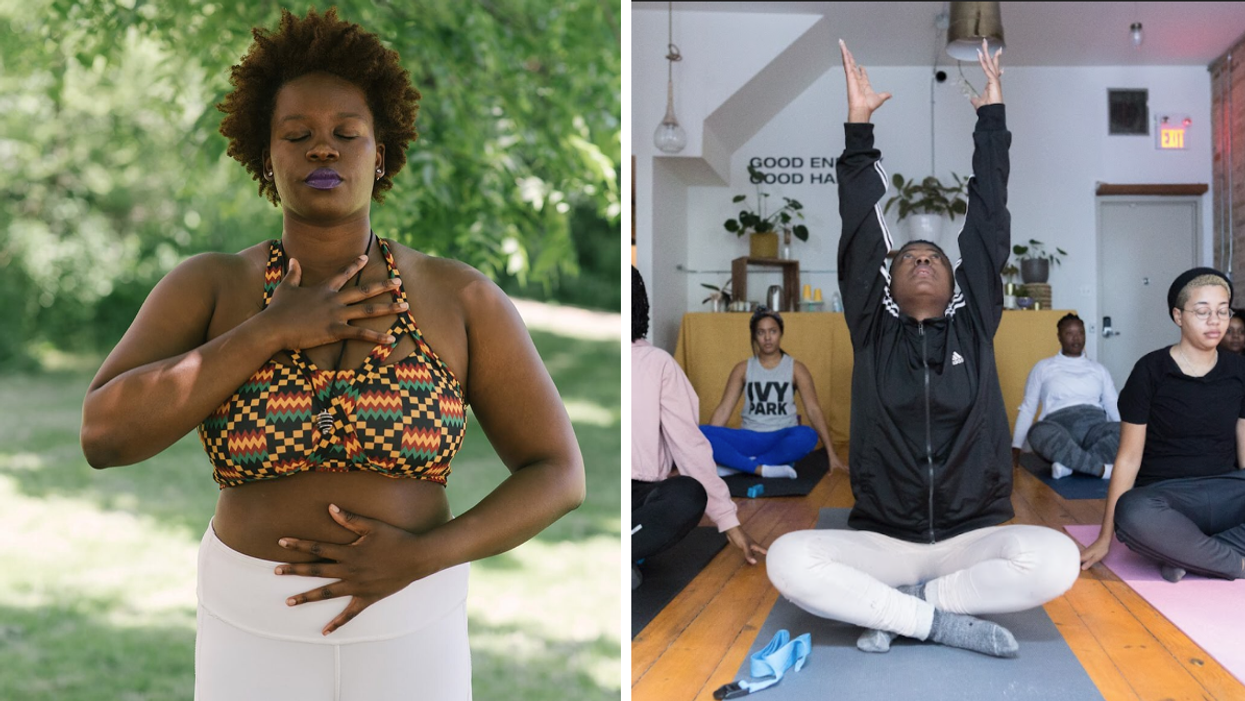Toronto Advocate Shares How You Can Get Involved In The Fight Against Anti-Black Racism
It takes more than just saying the right words.

One of Msosa's wellness programs in-session at Hill Studio in Toronto.
Although Black history month is here, the fight against anti-Black racism is year-round.
Narcity spoke with a Toronto-based advocate and support worker, Yamikani Msosa, about how people from different backgrounds can get involved in the daily fight against racism towards Black people.
Anti-Black racism has been seen as a public health crisis by the City of Toronto since 2020, and today there is still room for discussions about how we should navigate difficult conversations surrounding race and discrimination.
Msosa, who works as a movement practitioner, uses a variety of yoga and wellness practices to create space for people, especially those who are Black, to connect and feel their bodies. Their aim is to use embodiment and connection with oneself through movement as a form of resisting oppression.
"I think often with racism, and other forms of systemic oppression, whether it be transphobia, homophobia, ableism, there's often this different body route that occurred," they told Narcity.
Here's what Msosa said about how you can get involved in challenging anti-Black racism in your daily life.

Check your complicity
Msosa believes that understanding our relationship to systemic injustice is the key to challenging anti-Black racism.
"How do you see systemic injustice is played out? How does that make you feel? Are you apathetic?" they said.
They noted that people often express how they "feel" bad about anti-Black racism, but not that they "think" it's bad. That is the difference between what turns feeling into action, Msosa explained.
"How do you negotiate [that] relationship when your cousin or your aunt or your dad says something that's really messed up and racist? Are you just gonna sit there in silence? Because there are no Black people around?" they pressed.
Msosa expressed that turning that feeling into action can come in the form of taking a critical pause and asking yourself how you contribute to anti-Black racism in society.
"I think it needs to require a deep sense of authenticity. And that invites us to think about the ways that we're always existing in deep contradiction," they told Narcity.
Understand racism is an everyday problem
Msosa said that people often either want a checklist of how to combat anti-Black racism or be taught the right terminology and what anti-Black racism is. But the reality they explained, was that this doesn't teach people to actually care about these issues.
"I can give you the terminology of systemic and institutional personal dynamics of anti-Black racism, but I can't teach you to actually give a f*ck about the realities that we face as Black communities in all of our different intersections."
"It also needs to be a real reality in terms of like, how you negotiate racism on an everyday basis, rather than a performative like Black Lives Matter. How do you do it when no one is looking?"
"I say it's more of a heart exercise than it is an intellectual exercise."
Make relationships in the Black-community
From what they've seen, Msosa said people have expressed that they didn't know what it was like to navigate an anti-Black world until they had some sort of connection or relationship with Black people.
"What you need to do is sit down and think about how people can be in the right relationship with one another," they said.
Taking action, Msosa told Narcity, can come in the form of getting involved with organizations like Showing Up For Racial Justice (SURJ) Toronto. A GTA-based grassroots organization, SURJ not only works to support BIPOC social justice movements but also helps connect and build relationships between white people who feel unsure of how to help their fellow citizens and those who are involved in movements that challenge systemically racist systems.
"All of those contribute to a form of action that can change the realities of Black folk."
Support the abolishment of police
Msosa says that fighting against anti-Black racism includes challenging and abolishing the police.
Toronto Police has had a history of disproportionality arresting and using excessive force with people in the Black community.
In an Ontario Human Rights Commission report, it was revealed that Black people were more likely to be involved in use-of-force cases from proactive policing methods, which is when an officer chooses to stop and question someone, compared to reactive policing cases where officers respond to calls for assistance.
“We don’t know if we’re ever going to in this lifetime… see the police abolished. But that doesn’t mean you don’t take action towards it,” they said.
This interview has been condensed and edited for clarity.
- Historic Site Just 3 Hours From Toronto Reveals A Whole Other Side Of Canada’s Black History ›
- 5 Best Black-Owned Restaurants In Toronto For Mouthwatering Eats ... ›
- Toronto Police's Body Cameras Can Be Turned Off By Officers In ... ›
- ChatGPT's Advice On How To Deal With Racism In Canada Is Surprisingly Nuanced For An AI Bot - Narcity ›